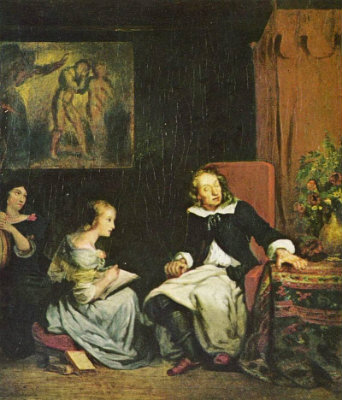Summary | Excerpt | Reviews | Beyond the Book | Read-Alikes | Genres & Themes | Author Bio

Critics' Opinion:
Readers' Opinion:
First Published:
Feb 2018, 272 pages
Paperback:
Jun 2019, 288 pages
 Book Reviewed by:
Book Reviewed by:
Cynthia C. Scott
Buy This Book
This article relates to All the Names They Used for God
In "The Killer of Kings," the short story in Anjali Sachdeva's collection All the Names They Used for God, John Milton (1608-1674), secluded in the English countryside after being charged and fined for publishing a tract that contemplated regicide, writes his epic poem
Paradise Lost with the help of a muse, an angel the blind poet can only see in his mind. The idea of Milton being inspired by a literal angel may seem like a literary conceit, but there is actual basis for this.
Born into a middle class family, Milton studied at St Paul's School in London until 1625 when he enrolled at Christ's College Cambridge. It appears that he initially planned to study for the priesthood but changed his direction, possibly after a conflict with one of his tutors. He graduated with a Bachelor of Arts degree in 1629 and a Master of Arts in 1632. Skilled in speaking and writing in French, Spanish, Italian, Hebrew, Latin, and Greek, his first book, Poems of Mr. John Milton, featured verses that were written before he was 20 years old and showcased his lifelong interests in theology and politics. More poems, such as "Lycidas," about the drowning death of his college friend, revealed his mastery in blank verse.
By the time of the English Civil War (1642-1651), a conflict which pitted Royalists loyal to King Charles I against the populists who wanted an end to the monarchy, Milton, a populist supporter, wrote pamphlets advocating divorce and freedom of the press. In his work "Areopagitica," written in 1644, he recalls his visit with Galileo Galilei years prior. The aging and blind astronomer was on house arrest in Florence after the Inquisition punished him for his heretical writings about earth and its place in the universe. This visit formed the basis of Milton's argument against censorship. In his tract "The Tenure of Kings and Magistrates" (1649), he argued in favor of regicide and against the divine right of kings.
 The controversial pamphlet eventually gained the attention and favor of Oliver Cromwell, the new leader of the Commonwealth government. In March 1649, Milton was offered the post of Secretary of Foreign Tongues to the Council of State, which he readily accepted. His chief responsibility was the drafting into Latin of diplomatic letters and papers which passed between the revolutionary English government and foreign powers. Though Milton would become ambivalent about the government after Cromwell suspended Parliament and gained absolute power and, certainly, after Cromwell's death when his son, Richard, rose to power, he continued his faithful service. It was during this time that Milton began to lose his eyesight. He also began working on his seminal blank verse poems, Paradise Lost and Paradise Regained.
The controversial pamphlet eventually gained the attention and favor of Oliver Cromwell, the new leader of the Commonwealth government. In March 1649, Milton was offered the post of Secretary of Foreign Tongues to the Council of State, which he readily accepted. His chief responsibility was the drafting into Latin of diplomatic letters and papers which passed between the revolutionary English government and foreign powers. Though Milton would become ambivalent about the government after Cromwell suspended Parliament and gained absolute power and, certainly, after Cromwell's death when his son, Richard, rose to power, he continued his faithful service. It was during this time that Milton began to lose his eyesight. He also began working on his seminal blank verse poems, Paradise Lost and Paradise Regained.
After the Restoration of the Monarchy and Charles II's rise to the throne, many of the Commonwealth supporters were executed, a fate that would have been Milton's had it not been for the intervention of friends like the influential poet and politician Andrew Marvell, who later assisted Milton while he wrote Paradise Lost. While writing the poem, Milton claimed his muse visited him one night during a dream. When he woke up, he began penning the verses that became the basis of the poem.
Paradise Lost was published in 1667, but its final revision, the version available today, was completed in 1674. John Milton died of gout shortly thereafter.
Picture of Milton Dictating Paradise Lost to His Daughters by Eugène Delacroix
Filed under Books and Authors
![]() This "beyond the book article" relates to All the Names They Used for God. It originally ran in April 2018 and has been updated for the
June 2019 paperback edition.
Go to magazine.
This "beyond the book article" relates to All the Names They Used for God. It originally ran in April 2018 and has been updated for the
June 2019 paperback edition.
Go to magazine.





The Funeral Cryer by Wenyan Lu
Debut novelist Wenyan Lu brings us this witty yet profound story about one woman's midlife reawakening in contemporary rural China.
Your guide toexceptional books
BookBrowse seeks out and recommends the best in contemporary fiction and nonfiction—books that not only engage and entertain but also deepen our understanding of ourselves and the world around us.